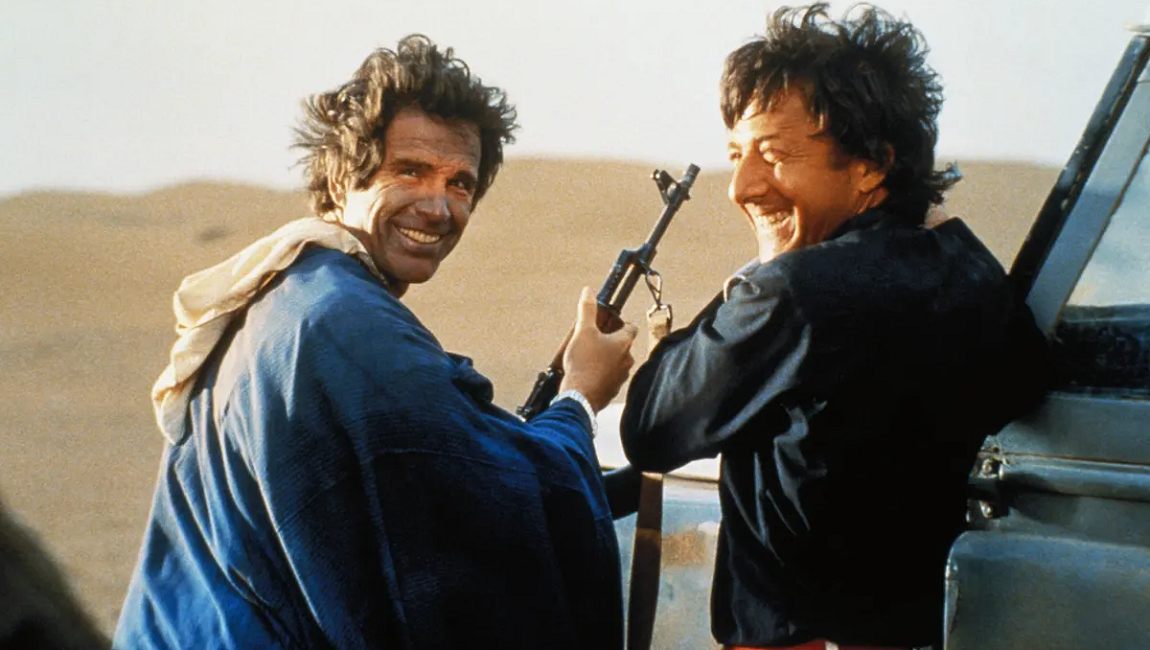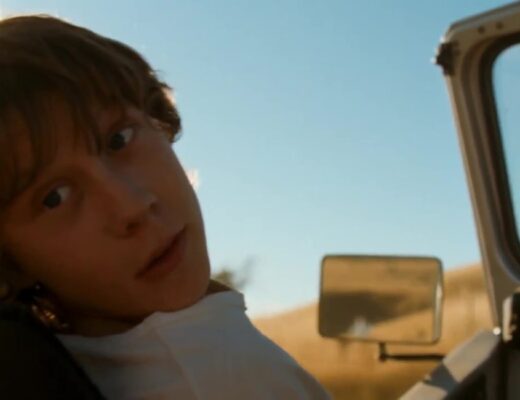“Telling the truth can be dangerous business,” sing Lyle (Warren Beaty) and Hawk (Dustin Hoffman) in Ishtar (1987), words that seem especially true for Elaine May, the film’s director. Ishtar was destined to become one of Hollywood’s greatest flops for a number of reasons — everyone from the stars to the producers to the talent agents were blamed at the time — but 35 years removed from all the industry gossip, it’s hard not to feel that May’s satire might have simply hit a little too close to home. This is a movie about failed American entertainers after all, and, in the Reagan years, stories about failed entertainers had just become serious business. For, as Lyle and Hawk sing later in that same song, “honest and popular don’t go hand in hand.”
Two folk-singing bozos who think their hammy songs are artistic masterpieces on the level with Simon and Garfunkel, Lyle and Hawk embody all the corn, kitsch, and naïveté of American pop culture in one big, goofy smile. They’re preternatural dreamers with their minds on little else besides making it in showbusiness; man-children to the utmost, everything from their jobs to their girlfriends fall to the wayside. When they head to Morocco to work a gig as hotel lounge singers, which they’re convinced is their big break, they end up, as Americans are prone to do, getting wrapped up in a geopolitical clusterfuck that they barely understand. Unwitting pawns in a power struggle between the CIA-backed Emir and the Soviet-backed rebels, Lyle and Hawk stumble through Morocco and the fictional country of Ishtar, wreaking havoc everywhere they go.
Modeled after the Bob Hope- and Bing Crosby-starring Road To… series of movies, May works biting U.S. foreign policy satire into laugh-a-minute broad comedy, eschewing nuanced political analysis for a larger burlesque of American ineptitude and immaturity. Far from an oversight, the film’s decision to play complex international tensions as dumb-eyed Hollywood comedy is one of its most subversive streaks; mocking not only the stupidity of the American government, but also American audiences themselves and their inability to comprehend serious subject matters outside of anything but the kitschiest and most asinine of pop culture forms. In this way, Lyle and Hawk are something of audience stand-ins: they never comprehend what’s going on in terms of the regional conflict or how they’re implicated in it, but instead bring everything back to a childish love triangle they’ve developed between them and a pro-communist guerrilla, Shirra Assel (Isabelle Adjani).
While much has been made of May’s penchant for indulgent on-set improvisational work — Ishtar allegedly had just north of 100 hours of raw footage — May offsets Ishtar’s richly drawn character work with a broad style of slapstick farce unique among her four features. Unlike the relentless prattle of Mikey and Nickey, the long montage of Lyle and Hawk developing their act together, which opens the film, eventually gives way to old-hat shticks that May breathes full life into, such as a keystone cops-esque routine in a crowded market featuring CIA agents wearing poorly-fitting djellabas with their neckties poking out, and mistakenly shooting at everyone. This merging of comedic tones allows her to deliver all of the geopolitical buffoonery as the blatantly obvious and hackneyed idiocy that it is, without ever losing the wide-eyed, and sympathetic, human naïveté of the American consumer — Lyle, Hawk, me, you — that makes it all possible.
To judge by our two most recent ex-presidents, one of whom is a failed entertainer while the other is currently angling for an EGOT, little has changed in our national character since Ishtar flopped at the multiplexes 35 years ago; the pop and dazzle of show business is our proudest achievement, and might always be. For Lyle and Hawk, quixotic knights chasing the American dream, landing a record deal is all one could want in life, and as for the country they’ve bungled themselves into, well, to quote their George Bush-ean lyric which nearly ends the film, Ishtar is “more than a country, it’s a state of mind.” For Lyle, Hawk, and us Americans, the whole wide world might be little more than a state of mind, and we it’s dazzling stars.
Part of Kicking the Canon – The Film Canon.







